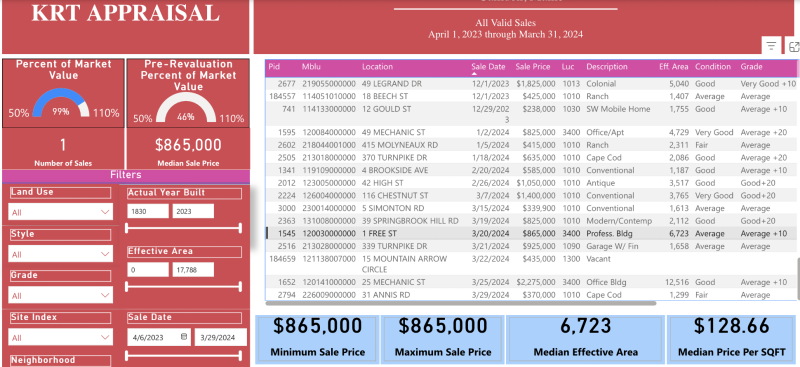CAMDEN – It was not exactly unanticipated, but the collective shock felt by property owners in Camden is high this week as letters sent from the town office presented their revaluation numbers – and the increases were not modest.
Camden’s total value has increased 44 percent in 2024, going from $1,694,784,331 in 2023 to $2,438,350,302, a difference of $743 million.
Camden, which is 80 percent residential, had hit the $1 billion mark in 2014. Ten years later, it hit the $2.4 billion mark.
The increases affected just about everybody – if not every piece of property – from Start Road on the northwestern edge of Camden, to Bay View Street, on Camden Harbor and Penobscot Bay.
It is not a new phenomenon, but the increases this year were extra steep. Real estate values increased dramatically over the past decade, most recently since Covid.
“It is what people are paying for land, and the scarcity of it and the relative dearth of developed properties on the market,” said Camden Assessor Kerry Leichtman. “If you want to move to Camden and the market doesn’t offer what you want, you’ve got to build. So, the prices people are paying for land are pretty high. Rockport is only a little bit behind Camden on this.”
A full blown revaluation of all taxable property in Camden took place this past year, with assessor’s agents spread throughout town, visiting homes and businesses to put assessments on land and buildings.
The last full revaluation of Camden’s taxable property was in 2004. In 2017, 2019 and 2022, the town did statistical updates, using in-house data ((Read this 2021 story: Hot real estate market drives Camden, Rockport property assessment update), but a full revaluation is different and involves in-person assessments. Assessor’s agents measure each building on the parcel, inspect the interior of the dwelling and take a picture.
The 2024 revaluation was completed by KRT Appraisals, based in Haverhill, Massachusetts, a company that conducts multiple revaluations throughout New England.
Now, Camden property owners are on tenterhooks, waiting for the mil rate to be set and tax bills sent. That should occur in August or the beginning of September, said Leichtman.
He is responsible for adding up the various municipal appropriations approved by voters at the June 11 Town Meeting, as well as Camden’s share in supporting Knox County government, the Five Town CSD (Appleton, Camden, Hope, Lincolnville and Rockport ownership of Camden Hills Regional High School), the School Administrative District (Camden and Rockport shared ownership of their K-8 schools) and the Mid-Coast Solid Waste Corporation (Camden, Hope, Lincolnville and Rockport).
Those combined numbers then are divided by the town’s total taxable valuation, $2.4 billion. With that figure, Leichtman sets the 2024 mil rate and then sends the files to the tax bill printer.
The numbers, according to the Camden municipal budget, are:
Municipal budget: $13,054,140 (this number includes Mid-Coast Solid Waste: $239,025)
SAD 28: $10,413,961
Five Town CSD: $4,724,206
Knox County: $2,062,017
TIF finance plan: $1,152,296
Total: $31,406,619.94
The mil rate will decrease substantially, Leichtman said. The total appropriation divided by the valuation will result in a lower mil rate because those combined appropriations have not increased by 44 percent (the total revaluation increase for the town).
However, whether individual tax bills will increase this year or decrease depends on how much an individual property itself increased in value. If the property value increase exceeds the average increase in value, then the tax bill could increase.
“It is going to up for some people, down for others, stay the same for others,” said Leichtman. “Setting the mil rate is the last thing we do, once all the numbers are finalized.”
KRT has listed the current and new numbers for every property owner and every street in Camden, at the company’s website, krtappraisal.com/dist/camden.html. Additionally, KRT incorporated additional information and data about each property. That includes the sales that went into the determination of the values.
Its interactive table shows all sales used and ratios for property categories and attributes. The table also shows what the ratio was before the revaluation.
“You can see, for example, that we had 87 qualified sales overall,” said Camden Assessor Kerry Leichtman. “They had a median ratio of 96% and a median sale price of $650,000.”
The goal is to close the percentage difference between the fair market value of a home and the local assessed value. That keeps the town in line with state regulations.
Maine’s Constitution (Article 9, Section 7) requires that every 10 years the town perform a general valuation to bring property values in line with the current real estate market.
“While the public expenses shall be assessed on estates, a general valuation shall be taken at least once in 10 years,” the Maine Constitution says.
“Taxation. All taxes upon real and personal estate, assessed by authority of this State, shall be apportioned and assessed equally according to the just value thereof.”
To keep up with that task in an exploding real estate market is what coastal communities in Maine are especially finding hard to do.
“The market keeps growing,” said Leichtman.
If the market starts to reverse itself, the town has incorporated a little leeway. Leichtman set the goal of aligning with state valuation at 95 percent.
When the market softens, as it has started to do, the asking prices will come down, he said.
“Will that continue,” he asked. “If the feds are talking about a rate cut, markets might heat up again.”
Any change to reduce the load on property taxpayers must be effected through the Legislative process.
Named Maine Assessor of the Year in 2023, Leichtman is on the Maine Board of Property Tax Review and serves on Maine Municipal Association’s Legislative Policy Committee. He wants Maine legislators to establish a tax force to research other states and their approach to easing taxes for the property owners. Local sales tax is one approach to consider.
LD 290, the Property Tax Stabilization for Senior Citizens program, enacted in August 2022, was swiftly repealed by the Maine Legislature on July 6, 2023, with an effective date of October 11, 2023.
That program allowed Maine seniors 65 and older who owned a permanent residence for at least 10 years and were receiving a homestead exemption, to freeze taxes at the previous year’s level regardless of income.
Another approach that Massachusetts implements is taxing second homes at a higher rate. That state allows each town to opt in and set its own rates within parameters set by the state.
“The important takeaway is that other states are doing things, even Singapore,” said Leichtman. “There are things out there, but lawmakers need to get off their butts and look at what other governments are doing to provide tax relief.”
Reach Editorial Director Lynda Clancy at lyndaclancy@penbaypilot.com; 207-706-6657

































